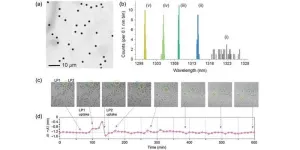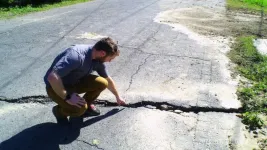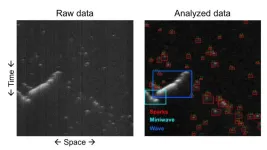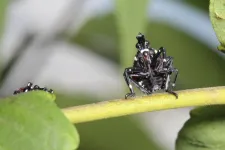(Press-News.org) For roughly 80% of breast cancer survivors, treatment doesn’t end with surgery, radiation and chemotherapy. Instead, for the next five to 10 years, doctors recommend that they take medication to block sex hormones, which can fuel tumor growth and spark recurrence.
The drugs are life-saving: They’ve been shown to cut risk of cancer recurrence by as much as half in patients with hormone receptor-positive tumors (HR+)—the most common form of breast cancer. Yet despite their promised benefits, 40% of patients stop taking them early and a third take them less frequently than directed.
New CU Boulder research, published this month in the Journal of Clinical Oncology, sheds light on why that is and what doctors and the health care system can do about it.
It found that, overall, interventions can increase medication adherence by nearly 1.5 times. But some strategies work better than others.
“Our bottom-line finding is that there are strategies that do work in supporting women to take these life-extending medications, and that we as a cancer care community need to do better,” said senior author Joanna Arch, a professor in the Department of Psychology and Neuroscience and member of the CU Cancer Center on the Anschutz Medical Campus.
Arch noted these so-called “adjuvant endocrine therapies,” like the estrogen-blockers Tamoxifen and aromatase inhibitors, can be costly and come with a host of side effects, including weight gain, sexual side effects, joint pain, depression and sleeplessness.
“Imagine going from your normal estrogen activity to little or no estrogen within days. That’s what these medications do,” she said. “But the women who take them as prescribed also have lower recurrence rates and live longer. It’s a dilemma.”
As more next-generation cancer drugs, including chemotherapy agents, shift from infusions provided in a clinic to oral therapies taken at home, the medical community has grown increasingly interested in developing ways to make sure patients take their pills.
In a sweeping meta-analysis, Arch and her colleagues analyzed 25 studies representing about 368,000 women to gain insight into what works and what doesn’t.
Educational pamphlets are not enough
The study found that cost-cutting policy changes, such as providing generic alternatives or requiring insurance companies to cover pills at the same level as infusions, consistently worked. Such “oral parity laws” have been passed in 43 states in recent years.
In one study, participants were asked to create stickers to put on their pill boxes.
Mobile apps and texts to remind patients to take their medication and psychological/coping strategies also yielded modest improvements.
The study’s findings around managing side effects were complicated: Simply educating women on side effects, via pamphlets or verbal explanations, generally failed to increase the likelihood that women took their medication as directed.
But things such as physical therapy, exercise and behavioral counseling aimed at alleviating or managing side effects often worked.
“Education in and of itself is not enough. That is a clear finding,” said Arch, suggesting that doctors write referrals to practitioners who specialize in side effects and follow up with appointment reminders. “Most oncologists, I believe, don’t realize how low adherence is for these women. They assume that if they write the prescription, it’s being taken.”
Addressing mental health is key
One study included in the meta-analysis was Arch’s own.
In it, women were asked to identify their primary motivation for taking their medication—whether it was living to see their child or grandchild grow up, pursuing their art or running a marathon someday. Via an online program, they created a sticker with a photo representing that goal, and the words “I take this for…” below it. Then, they stuck it on their pill box.
Participants were more likely to take their pills, at least for the first month, than those who didn’t.
“Even just a tiny thing like this can help,” said Arch.
Notably, very few studies looked at whether treating depression can help. Arch, aiming to fill this gap, recently launched her own pilot trial.
“One of the most consistent predictors of not adhering to any medication is depression,” she said. “Depression taps motivation.”
The new Journal of Clinical Oncology study is the first meta-analysis to show that interventions can be helpful, and that’s important, said Arch, because insurance companies need data to make decisions about what to cover.
But the study also showed that the effects are relatively modest and that there is room for improvement.
Arch said she hopes the study will spark more research into novel ways to support survivors:
“We have a lot of work to do.”
END
Why breast cancer survivors don't take their medication, and what can be done
Roughly 40% of patients don't finish their life-extending medication. A new study explores how to help
2023-09-02
ELSE PRESS RELEASES FROM THIS DATE:
New scalable, etching-based technique for precise tuning of microdisk lasers
2023-09-02
Micro- and nanodisk lasers have recently emerged as promising optical sources and probes for various applications in the fields of nanophotonics and biomedicine. Their ability to achieve lasing at a deterministic wavelength and ultra-narrowband precision is critical for several applications in on-chip photonic communications, on-chip bioimaging, biochemical sensing, and quantum photonic information processing. However, the large-scale fabrication of such precise wavelength micro- and nanodisk lasers remains challenging. Current nanofabrication processes introduce randomness in ...
Seismologists use deep learning for improved earthquake forecasting
2023-09-02
For more than 30 years, the models that researchers and government agencies use to forecast earthquake aftershocks have remained largely unchanged. While these older models work well with limited data, they struggle with the huge seismology datasets that are now available.
To address this limitation, a team of researchers at the University of California, Santa Cruz and the Technical University of Munich created a new model that uses deep learning to forecast aftershocks: the Recurrent Earthquake foreCAST (RECAST). In a paper published today in Geophysical Research Letters, the scientists show how the deep learning model is more flexible ...
Software developed at UC Davis analyzes calcium ‘sparks’ that can contribute to arrhythmia
2023-09-01
(SACRAMENTO, Calif.) — A team of UC Davis and University of Oxford researchers have developed an innovative tool: SparkMaster 2. The open-source software allows scientists to analyze normal and abnormal calcium signals in cells automatically.
Calcium is a key signaling molecule in all cells, including muscles like the heart. The new software enables the automatic analysis of distinct patterns of calcium release in cells. This includes calcium "sparks," microscopic releases of calcium within cardiac cells associated ...
Could insights from ants help people build better transportation networks?
2023-09-01
Key takeaways
Ants can either forage for food as individuals or recruit other members of their colonies to help search for or carry food back to their nests.
UCLA biologists found that the strategies ants use to forage play a bigger role in how they build their nests than innate, evolutionary “blueprints” do.
When building nests, ants strike a balance between transportation efficiency and architectural constraints. Researchers say that observation could help humans design more efficient transportation systems tailored to specific needs.
Could ants’ nests hold the secret to reducing traffic congestion on the 405 Freeway?
In a new study, UCLA biologists ...
Invasive spotted lanternfly may not damage hardwood trees as previously thought
2023-09-01
UNIVERSITY PARK, Pa. — In 2012, when the spotted lanternfly (Lycorma delicatula) arrived in the U.S. from its home in China, scientists, land managers, and growers were understandably concerned that the sap-feeding insect would damage native and commercial trees. New long-term research led by Penn State has discovered that hardwood trees, such as maple, willow and birch, may be less vulnerable than initially thought.
“Since the lanternfly was first introduced to the northeastern U.S., the question has been, ‘How at-risk are our forests?’ said Kelli Hoover, professor of entomology at Penn State. “So far, we haven't had a good answer. Our study is the first ...
$26M NIH grant addresses environmental influences on child health
2023-09-01
EAST LANSING, Mich. – Backed by a $26 million federal grant, researchers at three Michigan universities, a leading health care system, and a state agency will continue a long-term study of how exposure to environmental factors during pregnancy and early childhood can impact health for a lifetime.
The funding from the National Institutes of Health, or NIH, is for the second phase of a national research program called ECHO, which stands for the Environmental Influences on Child Health Outcomes, and includes a sample of mothers, infants and children from across the United States. The first phase began in 2016.
“This award shows the research ...
LDL not the be all, end all in heart disease, heart attacks and stroke
2023-09-01
Milwaukee, Wis. – Sept. 1, 2023 – Despite advances in treatment for high cholesterol, heart disease remains the leading cause of death in the U.S. Scientists at the Medical College of Wisconsin (MCW) are investigating the role of a form of cholesterol called very-low-density lipoprotein – and their findings may lead to new treatment options in the future.
The research team is led by Ze Zheng, MBBS, PhD, MCW assistant professor of medicine (endocrinology and molecular medicine); co-leader of the MCW Cardiovascular Center’s Atherosclerosis, Thrombosis ...
Hot Jupiter blows its top
2023-09-01
A planet about 950 light years from Earth could be the Looney Tunes’ Yosemite Sam equivalent of planets, blowing its atmospheric ‘top’ in spectacular fashion.
The planet called HAT-P-32b is losing so much of its atmospheric helium that the trailing gas tails are among the largest structures yet known of an exoplanet, a planet outside our solar system, according to observations by astronomers.
Three-dimensional (3D) simulations on the Stampede2 supercomputer of the Texas Advanced Computing Center (TACC) helped model the flow of the planet’s atmosphere, ...
Kidder receives American Chemical Society’s 2023 Mid-Career Award
2023-09-01
Michelle Kidder, a senior R&D staff scientist at the Department of Energy’s Oak Ridge National Laboratory, has received the American Chemical Society’s Energy and Fuels Division’s Mid-Career Award for sustained and distinguished contributions to the field of energy and fuel chemistry. She was recognized for her scientific community service, leadership and contributions. Her research focuses on novel material development, methods and advanced characterizations for the separation and reaction chemistry of renewable energy resources including lignin and carbon dioxide.
Kidder, ...
Mukherjee elevated to senior member of IEEE
2023-09-01
Subho Mukherjee, an R&D associate in the Vehicle Power Electronics Research group at the Department of Energy’s Oak Ridge National Laboratory, has been elevated to the grade of senior member of the Institute of Electrical and Electronics Engineers, or IEEE. Senior IEEE members have made significant contributions to the profession and worked in the engineering field for 10 years or more.
As an electrical engineer, Mukherjee focuses on wireless power charging and developing wide bandgap semiconductor-based ...
LAST 30 PRESS RELEASES:
Scientists show how to predict world’s deadly scorpion hotspots
ASU researchers to lead AAAS panel on water insecurity in the United States
ASU professor Anne Stone to present at AAAS Conference in Phoenix on ancient origins of modern disease
Proposals for exploring viruses and skin as the next experimental quantum frontiers share US$30,000 science award
ASU researchers showcase scalable tech solutions for older adults living alone with cognitive decline at AAAS 2026
Scientists identify smooth regional trends in fruit fly survival strategies
Antipathy toward snakes? Your parents likely talked you into that at an early age
Sylvester Cancer Tip Sheet for Feb. 2026
Online exposure to medical misinformation concentrated among older adults
Telehealth improves access to genetic services for adult survivors of childhood cancers
Outdated mortality benchmarks risk missing early signs of famine and delay recognizing mass starvation
Newly discovered bacterium converts carbon dioxide into chemicals using electricity
Flipping and reversing mini-proteins could improve disease treatment
Scientists reveal major hidden source of atmospheric nitrogen pollution in fragile lake basin
Biochar emerges as a powerful tool for soil carbon neutrality and climate mitigation
Tiny cell messengers show big promise for safer protein and gene delivery
AMS releases statement regarding the decision to rescind EPA’s 2009 Endangerment Finding
Parents’ alcohol and drug use influences their children’s consumption, research shows
Modular assembly of chiral nitrogen-bridged rings achieved by palladium-catalyzed diastereoselective and enantioselective cascade cyclization reactions
Promoting civic engagement
AMS Science Preview: Hurricane slowdown, school snow days
Deforestation in the Amazon raises the surface temperature by 3 °C during the dry season
Model more accurately maps the impact of frost on corn crops
How did humans develop sharp vision? Lab-grown retinas show likely answer
Sour grapes? Taste, experience of sour foods depends on individual consumer
At AAAS, professor Krystal Tsosie argues the future of science must be Indigenous-led
From the lab to the living room: Decoding Parkinson’s patients movements in the real world
Research advances in porous materials, as highlighted in the 2025 Nobel Prize in Chemistry
Sally C. Morton, executive vice president of ASU Knowledge Enterprise, presents a bold and practical framework for moving research from discovery to real-world impact
Biochemical parameters in patients with diabetic nephropathy versus individuals with diabetes alone, non-diabetic nephropathy, and healthy controls
[Press-News.org] Why breast cancer survivors don't take their medication, and what can be doneRoughly 40% of patients don't finish their life-extending medication. A new study explores how to help








